WASHINGTON – A majority of the Supreme Court justices on Monday appeared highly skeptical of claims that the Biden administration crossed the line from persuasion to coercion when it directed social media platforms to remove problematic content. .
At issue is a pending injunction by a federal judge restricting contact between government officials and social media companies on a wide range of issues.
During oral arguments, justices across the ideological spectrum questioned whether the government officials' actions were illegal and whether the plaintiffs who filed the lawsuits could show they were directly harmed. Among the issues raised was a lack of evidence that government authorities had threatened to take punitive action if social media companies did not cooperate.
The Republican attorneys general of Louisiana and Missouri, along with five other social media users, filed a basic lawsuit accusing U.S. government officials of putting too much pressure on platforms to moderate their content. Individual plaintiffs include Jim Hoft, an opponent of coronavirus lockdowns and owner of the right-wing website Gateway Pundit.
The lawsuit makes various claims related to activities that occurred before 2020, including efforts to stop the spread of misinformation about the coronavirus and the presidential election. Although Donald Trump was president at the time, the district court's decision focused on actions the government took after President Joe Biden took office in January 2021.
Several justices questioned whether the nature of the communications was at fault, with liberal Justice Elena Kagan noting that officials can sometimes engage in difficult communications with journalists.
“This happens literally thousands of times a day in the federal government,” she said.
Conservative Chief Justice John Roberts similarly noted that the federal government is “not a monolith.” That means a complaint from one department isn't necessarily a sign that another agency will take action if the post isn't removed.
“That would have to significantly dilute the concept of coercion, wouldn't it?” he said.
Fellow conservative Justice Amy Coney Barrett said Louisiana Attorney General Benjamin Aguignaga's argument that mere encouragement by the government could constitute a tort could make routine activities “extremely dangerous.” It will expand widely.”
Liberal Justice Ketanji Brown-Jackson told Aguinaga that under his interpretation of the law, the government would ask social media platforms to remove viral posts encouraging teens to jump out of windows. I asked if that could potentially be illegal.
“Are you of the view that government authorities could not have declared this situation a public emergency and encouraged social media platforms to remove the information that is causing this problem?” she said.
Aguignaga said government action could cross a line if it goes beyond expressing concern about the content and demands that the post be removed.
Conservative Justice Brett Kavanaugh also appeared skeptical of the plaintiffs' claims of coercion.
“What do you do with the fact that platforms are constantly saying no to governments?” he said.
Last July, Louisiana-based Judge Terry Doty ordered authorities to “promote, encourage, pressure, or induce in any way to remove, remove, suppress, or abridge content containing protected free speech. Banned all types of communication with social media companies.
The New Orleans-based U.S. Court of Appeals for the Fifth Circuit narrowed the scope of Doughty's injunction. But the appeals court still urged the White House, FBI and top health officials not to “force or substantially encourage” social media companies to remove content the Biden administration deems misinformation.
When the Supreme Court agreed to hear the case in October, three conservative justices, Samuel Alito, Clarence Thomas and Neil Gorsuch, said they disagreed with the decision and blocked the appeals court's ruling.
The justices are hearing a similar case Monday that alleges New York state officials improperly pressured companies to end their relationships with the National Rifle Association, a major gun rights group.
Both cases concern a practice known as “jawbone,” in which governments ask private entities to do what they want, sometimes with the implicit threat of negative consequences if their demands are not met. . Those challenging the government's actions say in each case there were violations of the First Amendment, which protects free speech.
In the NRA lawsuit, the group alleges that its free speech rights were violated by the actions of Maria Vullo, then head of the New York Department of Financial Services.
Mr. Vullo's office was investigating the insurance companies the NRA worked with to provide insurance to its members. The NRA alleged that Vullo made “backchannel threats to cease providing services to the NRA” in meetings with insurance companies.
Vullo spoke out in the wake of the 2018 Parkland, Florida, school shooting that left 17 people dead, urging insurance companies and banks to reconsider their relationships with gun rights groups.
The NRA is appealing a 2022 ruling by the New York-based U.S. Court of Appeals for the Second Circuit that found Vullo's actions did not constitute a tort.
In his defense, Vullo argued that part of his job was to warn companies about the “reputational risks” of doing business with the NRA.
The case received additional attention after the American Civil Liberties Union, which often supports liberal causes, signed on on behalf of the NRA. The ACLU said it disagrees with the NRA's position but supports gun rights groups' right to speak.


